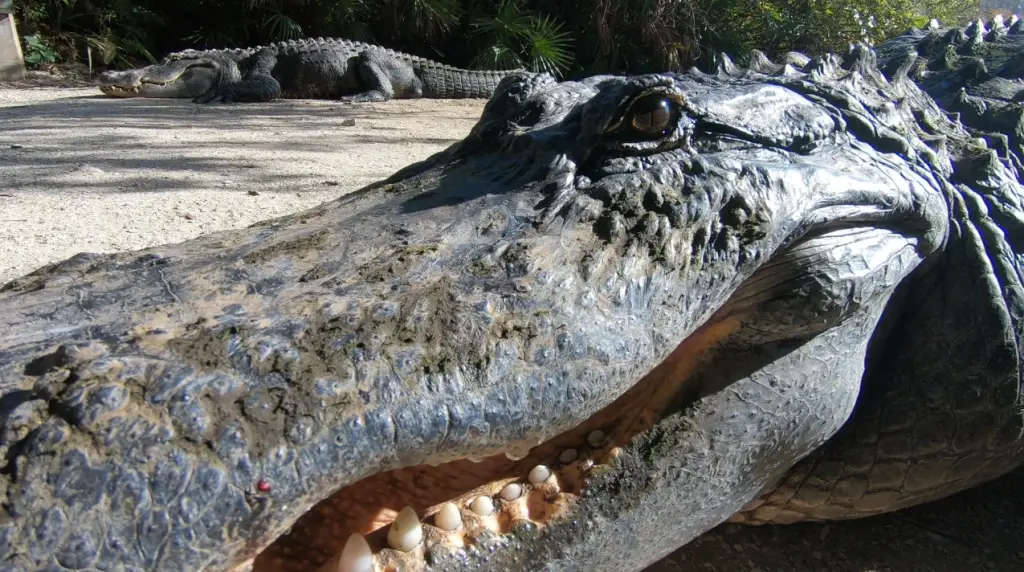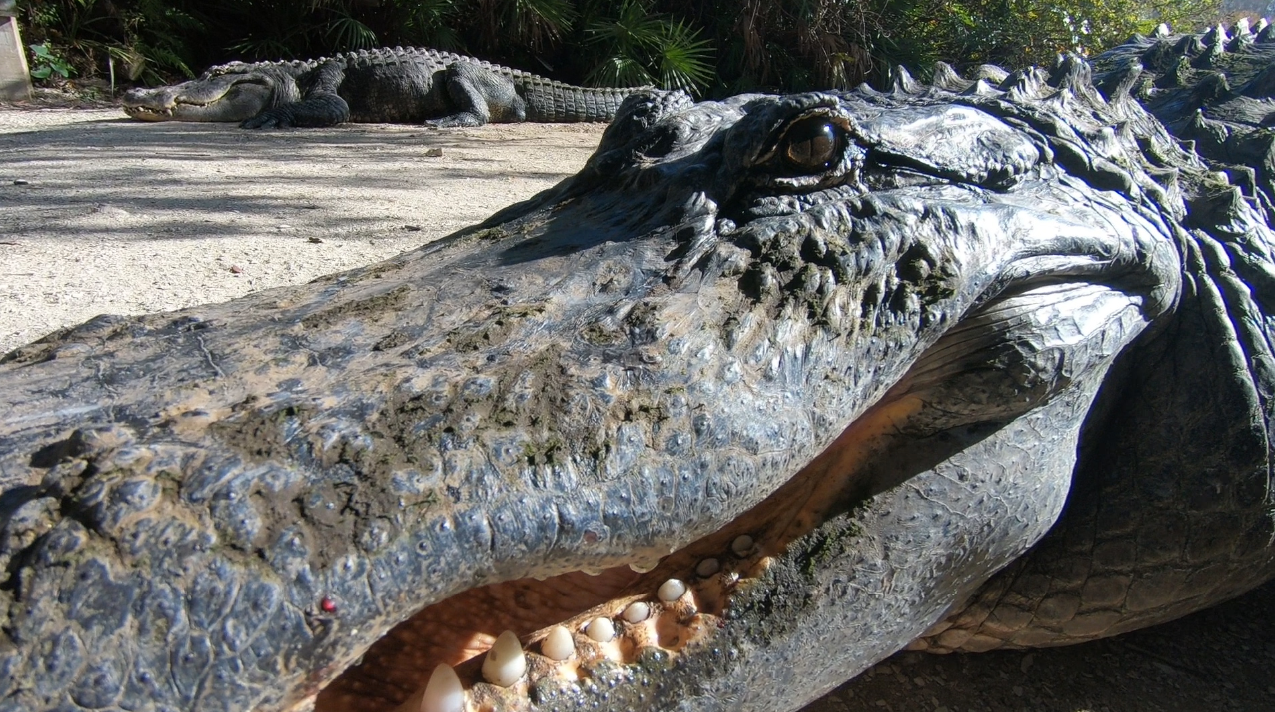Florida is well-known for its abundance of wildlife, from manatees to panthers. However, one creature that stands out among the rest is the alligator. With their sharp teeth and powerful jaws, these reptiles are a sight to behold. But where exactly can you find the most alligators in Florida?
If you’re looking to spot some alligators in Florida, you’re in luck. The state is home to over one million gators, with the highest concentration found in the southern part of the state. From the Everglades to Lake Okeechobee, there are plenty of opportunities to see these fascinating creatures in their natural habitat. So grab your binoculars and get ready for an adventure!
Florida is home to over one million alligators and the highest concentration of them can be found in the Everglades, located in the southern part of the state. Other areas with high alligator populations include Lake Okeechobee and the Kissimmee River.
Where Are the Most Alligators in Florida?
Florida is home to a vast population of alligators, with an estimated 1.3 million living within its borders. These reptiles can be found throughout the state, but some areas are more popular than others. In this article, we will explore the top ten locations where you are most likely to spot alligators in Florida.
1. Everglades National Park
Everglades National Park is a world-famous destination known for its unique ecosystem and diverse wildlife. This is also the best place to see alligators in Florida. The park is home to thousands of these creatures, and they can be easily spotted from the park’s many boardwalks and observation towers. Visitors can also take an airboat tour to explore the park’s waterways and get up close to alligators in their natural habitat.
Benefits of visiting Everglades National Park:
- Experience a unique ecosystem
- See diverse wildlife
- Get up close to alligators
2. Myakka River State Park
Located in Sarasota County, Myakka River State Park is a popular destination for hiking, camping, and wildlife viewing. The park is home to a large population of alligators, which can be spotted throughout the park’s many lakes and waterways. Visitors can take a boat tour or rent a kayak to explore the park’s waterways and get a closer look at these fascinating creatures.
Benefits of visiting Myakka River State Park:
- Great hiking and camping opportunities
- Opportunities for wildlife viewing
- Boat tours and kayak rentals available
3. Lake Okeechobee
Lake Okeechobee is the largest freshwater lake in Florida and is home to a large population of alligators. The lake covers over 730 square miles and has many areas where alligators can be easily spotted. Visitors can take a guided airboat tour or rent a boat to explore the lake’s many canals and waterways.
Benefits of visiting Lake Okeechobee:
- See the largest freshwater lake in Florida
- Spot alligators in their natural habitat
- Guided airboat tours available
4. Paynes Prairie Preserve State Park
Located in Gainesville, Paynes Prairie Preserve State Park is a unique destination known for its diverse ecosystem and wildlife. The park is home to a large population of alligators, which can be spotted throughout the park’s many lakes and waterways. Visitors can take a guided tour or hike one of the park’s many trails to get a closer look at these fascinating creatures.
Benefits of visiting Paynes Prairie Preserve State Park:
- Experience a unique ecosystem
- See diverse wildlife
- Guided tours available
5. St. Augustine Alligator Farm Zoological Park
If you want to see alligators up close and personal, head to the St. Augustine Alligator Farm Zoological Park. This park is home to over 25 species of crocodilians, including alligators. Visitors can see alligators in their natural habitat, watch feeding demonstrations, and even hold a baby alligator.
Benefits of visiting St. Augustine Alligator Farm Zoological Park:
- See alligators up close and personal
- Watch feeding demonstrations
- Hold a baby alligator
6. Wakulla Springs State Park
Wakulla Springs State Park is known for its crystal-clear waters and diverse wildlife. The park is home to a large population of alligators, which can be spotted throughout the park’s many lakes and waterways. Visitors can take a boat tour to explore the park’s waterways and get a closer look at these fascinating creatures.
Benefits of visiting Wakulla Springs State Park:
- Experience crystal-clear waters
- See diverse wildlife
- Boat tours available
7. Kissimmee Chain of Lakes
The Kissimmee Chain of Lakes is a series of interconnected lakes that covers over 100,000 acres in central Florida. These lakes are home to a large population of alligators, which can be easily spotted from the lakeshore or by taking a boat tour.
Benefits of visiting Kissimmee Chain of Lakes:
- See a series of interconnected lakes
- Spot alligators from the lakeshore
- Boat tours available
8. Corkscrew Swamp Sanctuary
Corkscrew Swamp Sanctuary is a nature preserve located in Naples, Florida. The preserve is home to a diverse ecosystem and many species of wildlife, including alligators. Visitors can take a boardwalk tour to explore the preserve’s many habitats and get a closer look at these fascinating creatures.
Benefits of visiting Corkscrew Swamp Sanctuary:
- Experience a unique ecosystem
- See diverse wildlife
- Boardwalk tours available
9. Lake Kissimmee State Park
Located in Polk County, Lake Kissimmee State Park is a popular destination for camping, hiking, and wildlife viewing. The park is home to a large population of alligators, which can be spotted throughout the park’s many lakes and waterways. Visitors can take a boat tour or rent a kayak to explore the park’s waterways and get a closer look at these fascinating creatures.
Benefits of visiting Lake Kissimmee State Park:
- Great camping and hiking opportunities
- Opportunities for wildlife viewing
- Boat tours and kayak rentals available
10. Fakahatchee Strand Preserve State Park
Located in Collier County, Fakahatchee Strand Preserve State Park is a unique destination known for its diverse ecosystem and wildlife. The park is home to a large population of alligators, which can be spotted throughout the park’s many lakes and waterways. Visitors can take a guided tour or hike one of the park’s many trails to get a closer look at these fascinating creatures.
Benefits of visiting Fakahatchee Strand Preserve State Park:
- Experience a unique ecosystem
- See diverse wildlife
- Guided tours available
In conclusion, Florida is a great place to see alligators in their natural habitat. Visitors can choose from a variety of destinations, each with its unique ecosystem and wildlife. Whether you want to see alligators up close or from a distance, there is a destination in Florida for you.
Frequently Asked Questions
What is the Distribution of Alligators in Florida?
Florida is home to over one million alligators, which is approximately 20% of the total American alligator population. Alligators can be found in all 67 counties in Florida, but the largest populations are concentrated in the southern and central regions of the state.
Alligators inhabit freshwater environments such as swamps, marshes, lakes, and rivers. They can also be found in man-made habitats such as golf course ponds, canals, and retention ponds.
Which Areas of Florida Have the Most Alligators?
The largest populations of alligators can be found in the southern and central regions of Florida. The Everglades and Big Cypress National Preserve are home to some of the densest populations of alligators in the world.
Other areas with high alligator populations include Lake Okeechobee, Kissimmee River, St. Johns River, and the Apalachicola River. Coastal regions such as the Gulf of Mexico and the Atlantic Ocean also have significant populations of alligators.
What Are the Dangers of Alligators in Florida?
Alligators are wild animals and should be treated with caution and respect. They are capable of causing serious injury or death if provoked or threatened.
The most common danger is accidental encounters, such as stepping on or near an alligator while walking in or near water. Swimming in areas where alligators are present is not recommended. Alligator attacks on humans are rare, but they do occur. It is important to always be aware of your surroundings and follow all posted warning signs.
What Should I Do if I Encounter an Alligator?
If you encounter an alligator in the wild, it is important to keep a safe distance. Do not approach or attempt to feed the alligator. If the alligator approaches you, back away slowly and avoid turning your back on the animal.
If an alligator is posing an immediate threat to human life, call 911 immediately. Alligator removal is best left to trained professionals who have the necessary equipment and experience to handle the situation safely.
Can I Hunt Alligators in Florida?
Alligator hunting is legal in Florida, but it is strictly regulated. A permit is required to hunt alligators, and the season is limited to specific dates and locations.
Alligator hunting is also limited to certain methods such as hook and line, bow and arrow, and harpoon. Firearms are not allowed for alligator hunting.
It is important to follow all regulations and guidelines set forth by the Florida Fish and Wildlife Conservation Commission when hunting alligators.
Which lake in Florida has the most alligators?
In conclusion, Florida is home to a large population of alligators, making it a popular destination for tourists and wildlife enthusiasts alike. While alligators can be found throughout the state, some areas are more populated than others, such as the Everglades and Lake Okeechobee. It’s important to remember that alligators are wild animals and should be treated with caution and respect. If you’re planning a trip to Florida and hoping to spot some alligators, be sure to do your research and take necessary safety precautions. Whether you’re a Florida local or visiting from out of state, seeing a wild alligator in its natural habitat is an unforgettable experience.



